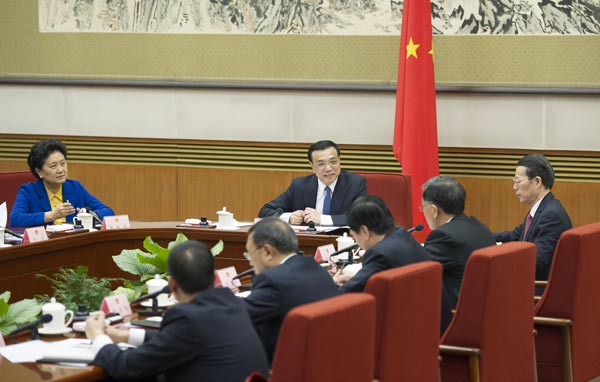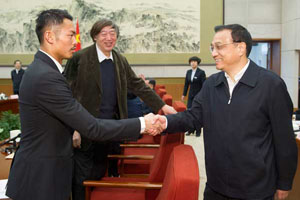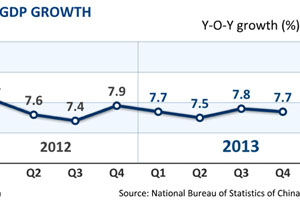Premier Li Kieqiang speaks at a meeting of the State Council to discuss the annual government work report that it will submit for lawmakers' approval at the National People's Congress annual session in March.[Photo/Xinhua]
Priorities include maintaining growth and controlling inflation

The "good beginning", he stressed, would require maintaining the desired growth momentum in the first quarter to avoid an unexpected slowdown.
The premier made the remarks at a meeting of the State Council to discuss the annual government work report that it will submit for lawmakers' approval at the National People's Congress annual session in March.
The report will propose the targets for GDP growth and inflation for 2014.
In 2013, China had a GDP growth rate of 7.7 percent year-on-year, as opposed to its target of 7.5 percent, while consumer inflation was kept at 2.6 percent, well under its target of 3.5 percent.
However, the premier warned: "We still face a grim situation at the start of 2014, which requires a serious effort to deliver the nation's sustainable, healthy economic and social development."
He called for accelerating the economy's structural reforms and promoting agricultural production while stabilizing prices.
Economists warned that consumer inflation pressure may increase after Lunar New Year because of the usually dry weather that has hit the nation.
Lian Ping, chief economist at the Bank of Communications, said that this year it will be difficult to keep the consumer price index, a main gauge of inflation, at its low 2013 level of 2.6 percent.
Ensuring sufficient food supply, especially in grain, is important to control consumer inflation, as food prices account for about 30 percent of the CPI, he said.
"The CPI is likely to rise 3 percent year-on-year in 2014," Lian said.
Besides the inflation pressure, another risk is that the Chinese economy may continue the trend of softening growth momentum in the first three months that began in the fourth quarter of 2013, analysts said.
They expect that a slowdown of GDP growth to less than 7.5 percent in the first quarter from 7.7 percent in the October-to-December period is possible because of moderate industrial production and investment amid weaker demand.
The manufacturing purchasing managers index, a gauge to indicate this sector's operating conditions, is expected to retreat to 49.6 in January from 50.5 in December, British bank HSBC reported on Thursday.
It would be the first time since August that the manufacturing PMI has fallen below 50, which separates contraction from expansion in the manufacturing industry.
A PMI subindex to show the output situation slipped slightly to a three-month low of 51.3 in January, compared with 51.4 in December. The new-orders component fell by 1.8 points to 49.8 in January, the lowest reading since August.
Qu Hongbin, HSBC's chief economist in China and the co-head of Asian Economic Research, said the marginal contraction of January's preliminary PMI figure was mainly the result of cooling domestic demand conditions.
"This implies softening growth momentum for manufacturing sectors, which has already weighed on employment growth," he said.
Qu suggested the policy tilt toward supporting growth to avoid repeating growth deceleration seen in the first half of 2013 amid relatively moderate inflation.
HSBC will report the final manufacturing PMI on Jan 30, and the official manufacturing PMI on Feb 1.
In December, the official manufacturing PMI retreated to 51 from 51.4 in November, a four-month low, according to the National Bureau of Statistics.
The growth of industrial output slowed to 9.7 percent in December, the lowest level since July, compared with 10 percent in November and 10.3 percent in October, the NBS said.
Wang Tao, chief Chinese economist at UBS AG, said that the slowdown in credit growth since the third quarter of 2013 and tight liquidity have decelerated industrial and investment growth.
"A bigger risk in 2014 is likely to come from domestic liquidity and credit volatility," she said.
"The government is attempting to achieve a tightening bias to slow credit growth; and the rapid development of China's shadow banking activities has made the system more sensitive to both a credit event in the shadow credit market and regulatory tightening."
Contact the writers at chenjia1@chinadaily.com.cn and lixiaokun@chinadaily.com.cn
|
Also popular |
|
 |
 |
| Premier vows to help startups | China's economy grows 7.7% in 2013 |
|
|
|
|
|
|
|
|
